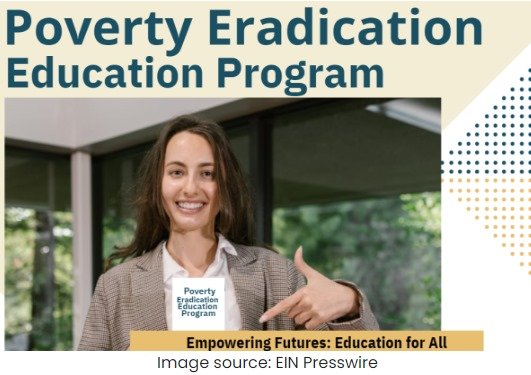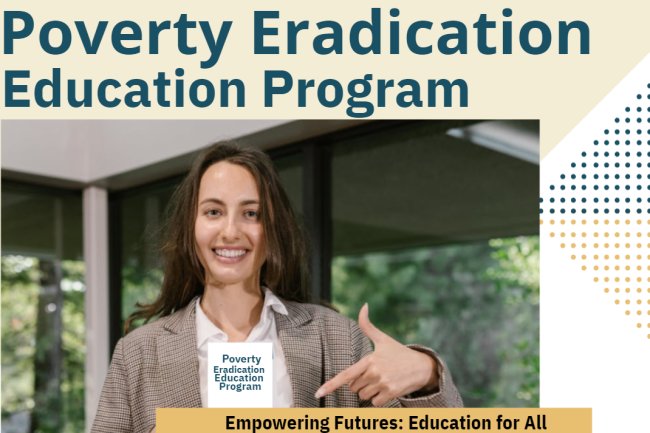Empowering the Next Generation: Launch of the Poverty Eradication Education Program.
Innovative initiative equips students with tools to combat poverty through entrepreneurship and community engagement.

SPOKANE, WA, UNITED STATES, November 13, 2024 /EINPresswire.com/ -- As part of its VISION2030 and mission to tackle root causes of global challenges, the World Subnationals Education Agency (WSEA) is excited to introduce the Poverty Eradication Education Program (PEEP), a transformative initiative aimed at empowering students with the skills and knowledge needed to tackle poverty through entrepreneurship, trade, and community involvement. One of the program's key features is its focus on purpose and hope, which is designed to support mental well-being, foster optimism, and inspire students at all levels to lead purposeful, forward-thinking lives.
Dr. Dominion V. Judah, President General of the World Subnationals and Nations (WSANDN), highlighted the importance of education in this critical effort, stating, "The right kind of education is key to poverty eradication. This Educational Program is to raise wealth creators who will become economic assets and job creators in their communities and nations." This vision underpins the development and implementation of PEEP, which aims to inspire youth to be active participants in their communities, creating lasting change.
Program Overview
PEEP encompasses distinct modules tailored to primary, secondary, and tertiary education levels, ensuring that students of all ages can engage in poverty eradication efforts.
Primary Education Program (Ages 6-12): This 10-week course is designed to inspire young pupils by fostering a mindset conducive to wealth creation and community engagement. Through interactive storytelling, hands-on activities, and discussions, students will learn foundational concepts of wealth and poverty, building a sense of empathy and responsibility.
Secondary Education Program (Ages 13-18): Spanning 12 weeks, this module empowers high school students to understand local and international trade, industrialization, and entrepreneurship. Utilizing case studies from local businesses, students will learn practical skills that they can apply in real-world contexts, driving economic growth in their communities.
Tertiary Education Program (Ages 18+): Also a 12-week initiative, this program equips university and college students with theoretical and practical knowledge related to poverty eradication through entrepreneurship and community engagement. By incorporating lessons on business development, financial literacy, and advocacy, students will be prepared to tackle economic challenges head-on.
Program Objectives
The overarching objectives of PEEP are designed to ensure that every participant gains valuable insights and practical skills:
Inspiration and Empowerment: Cultivate a growth mindset that encourages creativity, resilience, and a proactive approach to challenges.
Skill Development: Equip students with essential skills in entrepreneurship, financial literacy, and community engagement.
Community and Global Engagement: Foster an understanding of local and global economic issues, emphasizing the role individuals can play in addressing these challenges.
Inclusivity: Ensure all programs are non-discriminatory and accessible to all students, regardless of their background or circumstances.
Weekly Session Breakdown
Primary Program Highlights:
Week 1: Introduction to Wealth Creation and Poverty - Interactive storytelling sessions introduce key concepts.
Week 3: Financial Literacy Fundamentals - Students engage in budgeting and saving activities.
Week 10: Celebration and Reflection - Students present their projects to the community, celebrating their learning journey.
Secondary Program Highlights:
Week 1: Understanding Poverty and Its Impact - Discussions on how poverty affects education and opportunities.
Week 4: Introduction to Local and International Trade - Case studies of successful local businesses.
Week 12: Capstone Showcase and Reflection - Students present business proposals and community projects.
Tertiary Program Highlights:
Week 2: The Role of Entrepreneurship in Poverty Eradication - Guest speakers share their entrepreneurial journeys.
Week 5: Local and International Trade - Students analyze trade agreements affecting local businesses.
Week 12: Capstone Showcase and Reflection - A final presentation event invites community members to celebrate student achievements.
Community Involvement and Support
WSEA is committed to fostering community engagement through collaboration with local organizations and businesses. These partnerships will provide mentorship, resources, and real-world insights, ensuring that the program is adaptable to the specific needs of different communities. WSANDN encourages all agencies and partners to implement this program, creating a widespread positive impact.
Assessment and Evaluation
To ensure the effectiveness of PEEP, the program will incorporate regular assessments and evaluations. Feedback will be collected from students, parents, and community members, focusing on the creativity, feasibility, and community impact of projects developed throughout the program. Recognition will be given to outstanding projects and innovative ideas, motivating students to strive for excellence.
About WSEA
The World Subnationals Education Agency (WSEA) is a specialized agency of the WSANDN, committed to the development of the education sector worldwide. WSEA supports educational institutions in their efforts to eradicate illiteracy, offering free education, scholarships, and educational loans in collaboration with the World Subnational Education Fund.
About the World Subnationals and Nations (WSANDN)
Established to tackle the root causes of global challenges, WSANDN serves as a center for global cooperation, delivering real-time solutions to economic, social, cultural, and humanitarian issues worldwide. Founded on the principles outlined in its Charter, WSANDN is dedicated to promoting global peace, equality, human rights, and economic development. The organization operates under international law and aims to create a unified global community that prioritizes human dignity.
Conclusion
The WSANDN Poverty Eradication Education Program aims to inspire and empower young people to actively engage in wealth creation and economic growth. By fostering the right educational environment, we collectively work towards eradicating poverty globally. This initiative not only invests in the future of our children but also in the prosperity of our communities and the world at large.
As we launch this vital program, we invite community leaders, educators, and organizations to join us in this transformative journey. Together, we can cultivate a new generation of leaders dedicated to creating sustainable economic opportunities and addressing the pressing challenges of poverty.


















